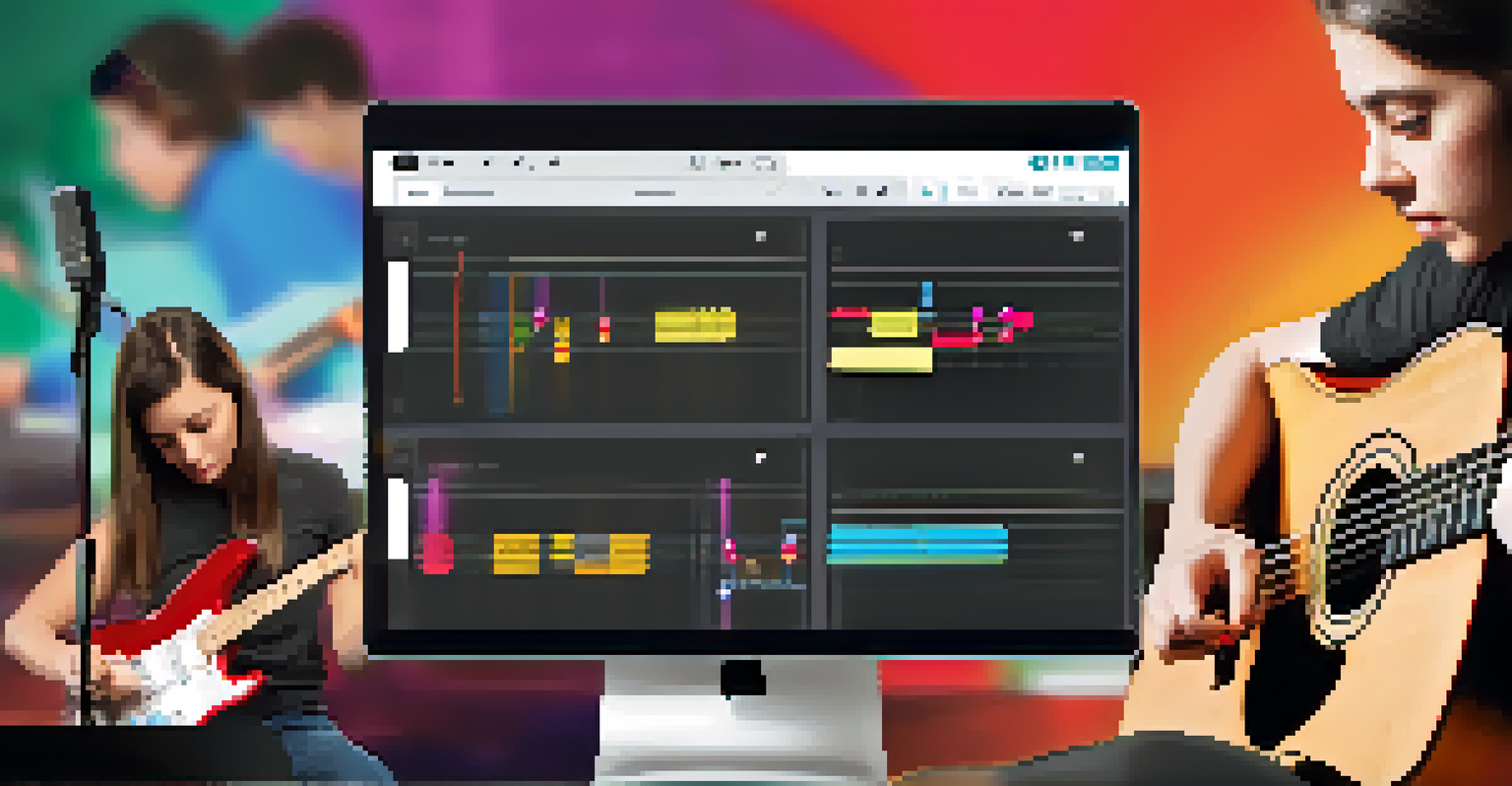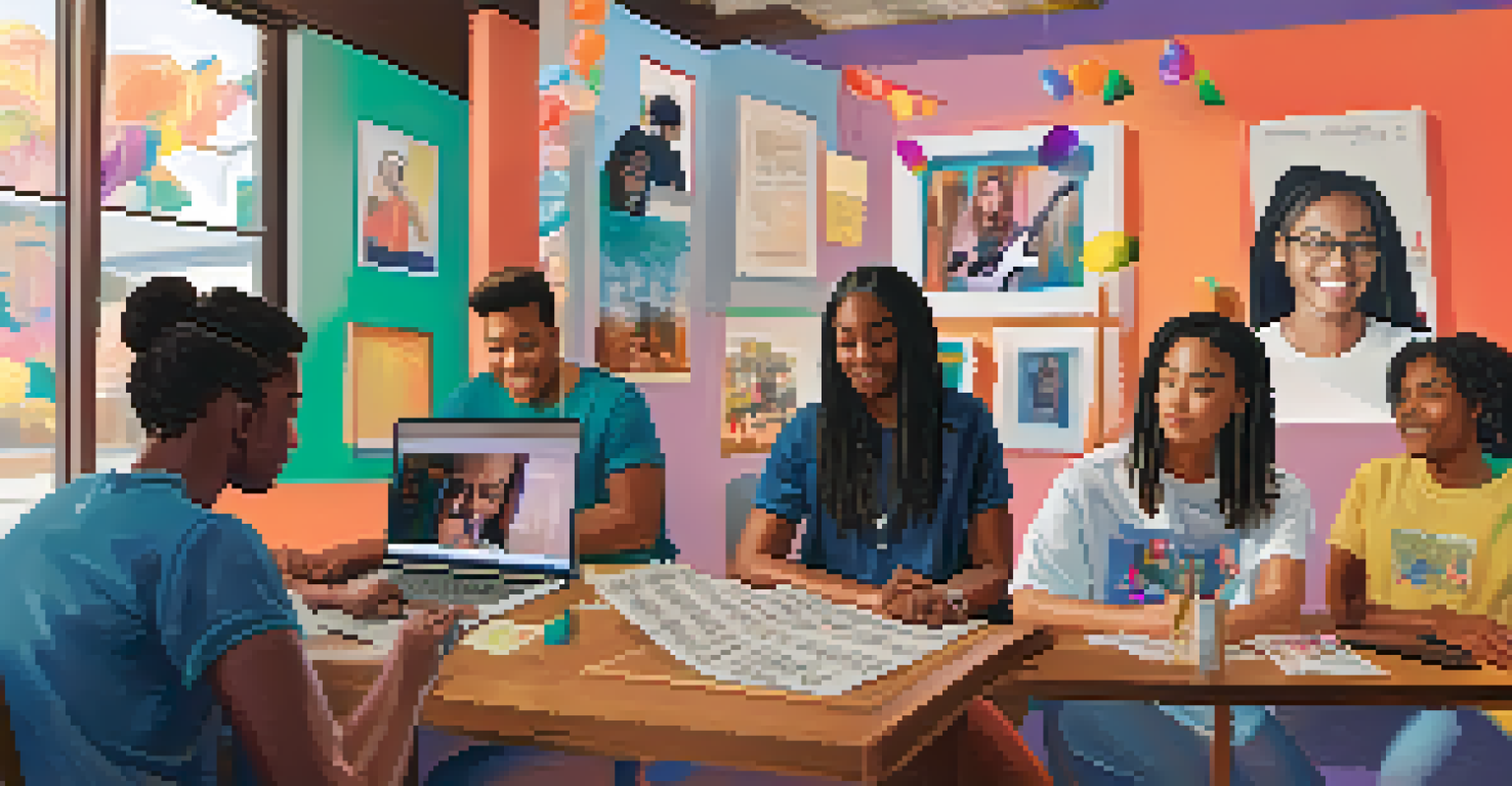Creating Online Guitar Lessons: Platforms and Best Practices

Understanding the Benefits of Online Guitar Lessons
Online guitar lessons offer flexibility and convenience, allowing students to learn at their own pace and schedule. This format can be especially beneficial for busy individuals who may struggle to attend in-person classes. Furthermore, the ability to access lessons from anywhere opens up opportunities for students to learn from renowned instructors around the world.
Music is the shorthand of emotion.
With the rise of digital technology, students can also access a wealth of resources, including video tutorials and downloadable sheet music. This abundance of materials can enhance the learning experience, making it easier for students to practice and improve their skills. Additionally, online lessons can be more cost-effective than traditional lessons, providing quality education without breaking the bank.
Finally, online guitar lessons foster a sense of community through forums and social media groups. Students can connect with fellow learners, share their progress, and gain valuable feedback. This supportive environment can motivate students to stay committed and engaged in their musical journey.
Choosing the Right Platform for Your Lessons
When creating online guitar lessons, selecting the right platform is crucial for success. There are several options available, including video conferencing tools like Zoom, dedicated learning platforms like Teachable, or even YouTube for free content. Each platform has its unique features, so consider what best fits your teaching style and your students' needs.

For example, if you prefer one-on-one interaction, a platform like Zoom might be ideal for live lessons. On the other hand, if you want to create pre-recorded content that students can access anytime, a platform like Teachable could be a better fit. Always ensure the platform you choose supports high-quality video and audio to provide the best learning experience.
Flexibility of Online Lessons
Online guitar lessons provide students the flexibility to learn at their own pace and from anywhere, making them ideal for busy individuals.
Additionally, consider the ease of use for both you and your students. A user-friendly interface will enhance engagement, while a complicated platform may deter learners. Take the time to explore various platforms and choose one that allows you to deliver your lessons seamlessly.
Creating Engaging Lesson Content
Engagement is key when creating online guitar lessons. Start by breaking down complex techniques into simple, digestible parts. Use analogies or relatable examples that help students visualize what they need to do, making it easier for them to grasp new concepts.
The beautiful thing about learning is that no one can take it away from you.
Incorporate a mix of teaching methods, such as video demonstrations, interactive exercises, and quizzes to keep learners actively involved. For instance, you might demonstrate a chord progression and then ask students to practice along with you. This varied approach can cater to different learning styles, making your lessons more accessible.
Lastly, encourage students to ask questions and provide feedback on the lessons. This interaction not only helps you improve your teaching but also makes students feel valued and invested in their learning process. Creating a supportive atmosphere will foster a sense of community and keep students motivated.
Utilizing Technology to Enhance Learning
Technology can significantly enhance the online learning experience, especially in music education. Tools like metronomes, tuning apps, and backing tracks can support students as they practice their skills. Integrating these resources into your lessons will help students develop their timing, pitch, and overall musicianship.
Moreover, consider using screen-sharing features during live lessons to demonstrate techniques directly on your screen. This can be especially beneficial for showing finger placements or chord shapes, allowing students to visualize the concepts in real-time. Visual aids can make a significant difference in understanding, particularly for visual learners.
Engaging Lesson Content
Creating engaging lesson content through various teaching methods helps cater to different learning styles and keeps students motivated.
Lastly, encourage students to record their practice sessions and share them with you. This not only allows you to provide personalized feedback but also helps students track their progress over time. By leveraging technology, you create a more immersive and effective learning environment.
Building a Community Around Your Lessons
Creating a sense of community can greatly enhance the online learning experience. Consider establishing a dedicated forum or social media group where students can share their progress, ask questions, and support one another. This sense of belonging can motivate students to stay engaged and committed to their learning.
Encourage collaboration among students by organizing group challenges or jam sessions. These activities can provide opportunities for students to showcase their skills and learn from each other’s experiences. When students feel connected to their peers, they are more likely to remain dedicated to their musical journey.
Additionally, sharing success stories or testimonials from your students can inspire others to stay focused on their goals. Highlighting individual achievements fosters a positive learning environment and encourages students to push their limits. Building a community not only enriches the learning experience but also strengthens your brand as an online guitar instructor.
Marketing Your Online Guitar Lessons Effectively
To attract students to your online guitar lessons, effective marketing is essential. Start by creating a professional website that showcases your teaching style, lesson offerings, and testimonials from satisfied students. An appealing website can serve as your online business card, helping potential students understand what sets you apart from others.
Utilize social media platforms to share engaging content, such as short guitar tips, lesson snippets, or performance videos. This not only showcases your expertise but also helps you connect with a wider audience. Engaging with your followers through comments and messages can build rapport and encourage potential students to consider your lessons.
Building a Community
Establishing a community among students fosters motivation and commitment, enhancing the overall online learning experience.
Consider offering free trial lessons or promotional discounts to entice new students to give your lessons a try. Once they experience your teaching firsthand, they’ll be more likely to commit to a full course. By strategically marketing your online guitar lessons, you can grow your student base and create a thriving online presence.
Evaluating and Improving Your Teaching Practices
Regularly evaluating your teaching practices is crucial for continuous improvement. Seek feedback from your students to understand what they find helpful and what areas may need enhancement. This can be done through surveys or informal discussions, providing valuable insights into your teaching effectiveness.
Additionally, consider recording your lessons for personal review. Watching your teaching style can reveal areas where you may improve clarity or engagement. Reflecting on your performance allows you to adapt and evolve your methods to better serve your students.

Finally, stay updated on the latest trends in music education and online teaching. Attending workshops or joining professional networks can expose you to new ideas and techniques. By being open to learning and adapting, you can ensure your online guitar lessons remain relevant and effective.